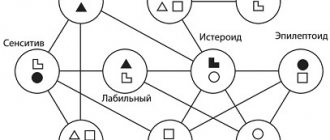- October 18, 2018
- Psychology of Personality
- Olesya Tolmacheva
Do not rush to draw conclusions about a person and define him as “abnormal” if his isolation and aloofness seem strange to you. Have you heard about such personality types as extrovert and introvert, or ambivert? In this article we will take a detailed look at each personality type, its characteristics, behavior and lifestyle. This article will help you not only understand those around you, but also gain a deeper understanding of yourself and your nature.
A little history
According to Carl Jung, the first psychotherapist who introduced the concepts of introversion and extroversion, an introvert directs all his energy inward. His life is based on internal sensations and reactions to external events. An extrovert is the direct opposite of an introvert. All his energy is directed to the outside world. From these two terms comes a third personality type that combines both introvert and extrovert traits: the ambivert. Have you already figured out what type of personality you are? Maybe you are an introvert, or an extrovert, or perhaps an ambivert?
What is the difference between an introvert and an extrovert? Who are they?
Extrovert and introvert
- These are opposite types of human personality. In this article we will figure out how they differ.
If you are interested in reading more about one of these personality types, you can do so on our website by following the link: “Who is an introvert?” or “Who is an extrovert?”
Strong extroverts and introverts will be considered. The fact is that there is also an ambivert, a person who has the character traits of both an introvert and an extrovert. But a separate article will be devoted to it.
Introvert
- this is a type of human personality, the main vital energy of which is directed inside the person himself. Such people are not very sociable, think a lot and prefer solitude or small companies.
Extrovert
- This is a type of human personality whose main vital energy is directed to the outside world. Such people are extremely sociable, do more than they think, and also prefer large and noisy companies where they are leaders.
Let's consider several life situations and standard behavior in them for each of the personality types discussed in the article.
- Going to barbecue with friends
.
The extrovert
is the one who organizes all this “movement”.
He will offer his options - place, time and will insist on them. He will call everyone a few minutes before the meeting to make sure that the company will be large enough, otherwise he may invite more people. If he meets friends along the way, he will definitely inform him that they can join the event. An introvert
does not like large companies, so he will go to a barbecue only if there is at least one person in the group with whom he has already communicated and enjoys doing so. Most likely, he does not know most people or knows them very superficially. An introvert will always make sure that there are enough supplies - the barbecue itself, alcohol, if it is implied, coals, ignition for the coals. He will ask how much money you need to put into the common piggy bank, whether anyone has a barbecue, whether it is possible to organize barbecues in the chosen place, etc. The main thing for an introvert is that everything is well thought out. - Choosing a place to work
.
An extrovert
is perfect for working with clients in person, for example, in the sales department.
Also, an extrovert, since he is always a leader, can easily head a department in some large company. The most important thing for an extrovert is a good large team, the opportunity for career growth, communication with clients or other departments of the company. For an introvert
, creative work or work for individuals is perfect - either a small team without a pronounced extrovert, or a position that implies the absence of direct colleagues. Example – remote work: copywriter, designer, programmer, etc. It is very important for an introvert to immerse himself in work without distractions.
You can come up with quite a lot of situations, it’s not difficult. But everything will always be the same: an extrovert is a leader, active, sociable; introvert – thoughtful, responsible, analytical. Both personality types have their advantages and disadvantages - both for themselves and for the people around them. But it cannot be said that one of them is better than the other. It’s just that an introvert and an extrovert have different paths through life.
Traits of Introverts
Let's plunge into the inner world of an introvert and highlight his characteristics, so that next time his aloofness and detachment will not be mistaken for arrogance and a bad attitude towards you.
- Introverts are in no hurry to make new acquaintances. Communication with new, unfamiliar people threatens them with a loss of energy. They have a very limited circle of people with whom they communicate.
- They avoid noisy companies and crowds of people.
- Introverts can be truly friends; they are devoted and faithful to their, albeit few, friends.
- Introverts need solitude to recharge wasted energy. Suddenly they disappear from sight. After the necessary recovery, they can continue their activities.
- A stranger will not be able to gain trust from an introvert. This will take time and patience.
- An introvert's politeness and humble demeanor earns people respect.
- Guests feel cozy and comfortable with an introvert, they can relax and feel at home.
- Introverts plan and try to find a balance between being social and being alone.
Introvert - what kind of person is this in simple words?
The concepts of introversion and extroversion are closely interrelated. To clearly understand them, you need to thoroughly understand the definition of both qualities.
An extrovert, in simple words, is a person who has a constant need for an external positive stimulus. His main mental activity is aimed at the surrounding social environment. He needs this to receive positive stimulation.
In simple words, an introvert is a person whose focus is on his own inner world. But this does not mean at all that he is not interested in external events. It’s just that initially he is focused on awareness of his feelings, on comprehending feelings, analyzing the thoughts that come to his mind. But this does not mean that a person does not notice the world around him.
An introvert and a person suffering from social phobia or avoidant anxious personality disorder are not the same thing. The first are absolutely healthy people with a characteristic mental make-up. Social phobes are sick people. They feel psychological discomfort in society. An introvert feels normal in society. It’s just that his comfort zone is in his inner world. Moreover, this category’s comfort zone may be a narrow social circle.
Introversion is not a pathology, as it is sometimes presented in certain circles. This is the absolute norm. Moreover, this category of people has great advantages compared to extroverts. And their strengths in most cases provide greater social success in life than extroverted individuals.
Behavior of introverts in society
As already written above, many may misinterpret the aloofness of introverts and mistake their behavior for arrogance, coldness and unfriendliness. These people just need time to get used to a new person.
A superficial explanation of any question will not be enough for an introvert; the deep meaning and reason are important to him, and he will get to the bottom of the truth.
Close people enjoy communicating with an introvert because he knows how to listen and empathize. Thanks to his deep inner world and desire to study every situation from all sides, he will be able to objectively assess the current situation and express a truthful opinion. Just be prepared for the fact that it may not match yours.
Introverts are creative people, their essence is manifested in creation. At the same time, the products of their creative activity can be both intangible results: ideas, texts, poems, and material objects: paintings, handicrafts and others.
No matter how strange it may sound, introverts love solitude. It is vital for them, since in society they spend a lot of energy, and in solitude they restore lost strength, comprehend what happened and draw conclusions. Introverts avoid noisy companies and, once at a party, they will disappear from view and retire to chat with one or two people.
Traits of extroverts
Extroverts bring smiles to the people around them because they are sociable, cheerful and active conversationalists. People with pronounced features of extraversion cannot imagine their life without society and suffer alone, because they need to give their energy to the outside world.
- They are open to new acquaintances, easily enter into communication with strangers, and constantly expand their social circle.
- Extroverts are characterized by ambition and a desire to win and be first.
- They easily carry on a conversation and often talk more than they listen.
- These individuals openly express their emotions and feelings in public, be it laughter, sadness or tears. And these emotions will be sincere and truthful.
- Extroverts show sympathy for the difficulties and problems of loved ones, provide support and do not stand aside.
- They willingly spend money and do not like to deny themselves pleasures. In this case, it is advisable to do nothing, but only enjoy the gifts of fate.
- Extroverts express themselves only in the outside world; communication is the source of their inspiration.
Psychological characteristics of extroverts, introverts, ambiverts
Extroverts
They focus on the outside world, proceed from its norms and rules of behavior, are sociable, proactive, and quickly find their place in society. Extroverts fill the entire external space, love to talk, listen less to someone, and are hasty in their statements (they speak first, then think about what was said).
They love publicity, have a wide circle of acquaintances, actively take part in joint activities and entertainment, and are regulars at parties and nightclubs. They quickly establish contacts with unfamiliar people and love it when they are the center of attention. They occupy leading positions in the company, seeking external positive evaluation as encouragement. Those who like to argue and discuss collectively new ideas and news.
Extroverts cannot be alone for a long time - it tires them. They will talk on the phone for a long time, filling this void. External assessment of not only their deeds, but also their appearance, abilities and work results is always important to them. They can simultaneously work, listen to music, answer questions, and comment on their own actions. And this diversity does not bother or distract them.
Introverts
They are less active and prefer loneliness to noisy companies. They don’t talk much, listen more to the interlocutor, think first, then talk, do not tolerate chatting on the phone (for them the phone is a means of communication, not an opportunity to communicate). They have few friends, their companies consist of 1-3 people. They are in no hurry to establish connections with people they don’t know well; they get to know each other slowly. An introvert experiences serious difficulties in communicating with them, because... cannot adapt to the style of someone else's behavior, so he tries to avoid contacts.
Outwardly, they look thoughtful and somewhat withdrawn. When they express their own thoughts or suggestions, they do not like to be interrupted. Personal plans and feelings are not shared, or they are voiced only to the closest people who are completely trusted. They can open up completely to them, and here the extroverted side of the personality begins to dominate.
When working, they require silence and do not tolerate distractions and empty chatter. If they have to speak publicly, they will spend a long time preparing and worry about the result. After the performance, it is important for them to be alone and think about what happened. They are very concerned about a possible negative result or troubles that may arise. But they will stubbornly defend their point of view. They can be intolerant, even oppressive, if their opinions are not taken into account.
Ambiverts
If, after analyzing what is described above, you understand that both are present in you, i.e. introversion and extroversion are equal, which means ambiversion. Such people are called ambiverts.
C. Jung often illustrated his arguments about people's psychotypes with references to famous people. For example, he classified F. M. Dostoevsky as an introvert, and L. N. Tolstoy as an extrovert.
Behavior of extroverts in society
There is a widespread opinion in society that, thanks to their ambition, sociability and high activity, extroverts achieve high results in work compared to their antipodes - thinking and judicious introverts. How do extroverts behave in life?
They attract people with their sociability and openness. These people easily adapt to current situations, despite the fact that planning is alien to them and they are characterized by spontaneity of decisions.
Just don’t mistake the spontaneity and openness of extroverts for superficiality. Like introverts, extroverts can have a rich inner world. They strive to achieve high results and direct all their accumulated knowledge, emotions and feelings to achieve their plans.
Extroverts openly express their emotions and feelings and willingly share their joys with the outside world.
They do not think about the motives of people’s behavior; directness and openness of actions are important to them. Often these individuals are surprised by their feelings and emotions and cannot explain them.
Extroverts do not know shyness and constantly make new acquaintances, establish new contacts and connections. They do not like the monotony of actions, this prevents them from realizing their ideas.
Extroverts easily express themselves in a team. Teamwork gives them pleasure.
Ambivert and its features
There is another personality type - an ambivert, or ambovert, as this type is sometimes called. But the second name is incorrect, remember. Maybe being an ambivert is the golden mean? And does it combine the best qualities of extroversion and introversion? The main feature of ambiverts is the ability to move from one state to another.
The average of an extrovert and an introvert creates a mixed personality type - an ambivert.
The activity of this person is replaced by outside observation. At one of the parties he can be a merry fellow and a ringleader, but next time do not expect similar behavior from him, as he will go into observation mode.
People close to an ambivert are confused when describing his character. Depending on the mood and type of activity, an ambovert, like an introvert, can be passive and quiet, or cheerful and active, like an extrovert. Some friends consider him cheerful and carefree, others - serious and reasonable.
An ambivert willingly attends noisy events as long as they are short in duration. He doses out into society and home privacy.
An ambivert can transform depending on the current situation. From a cheerful person he can turn into an ordinary observer and vice versa.
An ambivert is attracted to teamwork, despite the fact that it is easy for him to complete assigned tasks independently.
The video below contains a test that will answer the question of how to determine whether a person is an introvert or an extrovert.
Effective communication depending on personality type
We live in society and every day we come into contact with different personality types, among which we can find extroverts and introverts or ambiverts. Understanding the differences between these individuals will help you connect with them and build good relationships. Approaching these people correctly will give you advantages in both your personal and professional life.
Who are Ambiverts?
Having learned the ins and outs of extroversion and introversion, we can talk about who ambiverts are. This concept was introduced into psychology relatively recently. Ambiverts are people who equally possess the traits of both psychotypes. A person who is an ambivert can channel their libido into both the outer and inner worlds. This personality type is considered very flexible, easily adapting to the environment and situation. People of this psychotype are almost equally comfortable both in society and alone; Ambiverts are able to behave completely differently in a given situation.
However, not all so simple. Ambiverts cannot behave exclusively as introverts or exclusively as extroverts for a long time. For their own comfort, they need to constantly alternate these roles.
If the reader decides to test his ability to determine a psychotype, then ambiverts are those people who can easily spoil the guessing statistics. We can say that they are an exception to the rule of dividing personalities into introverts and extroverts.
How to determine your personality type?
The above characteristics of extroverts and introverts will help you in solving this problem. Observe the person you are interested in, highlight his characteristics of behavior, communication with other people, and perception of the current situation. Do not rush to draw conclusions and categorize a person as “strange”, “normal” or “abnormal”, accept these characteristics and establish communication depending on his personality type. By getting to know people and establishing successful relationships with different personality types, you improve your skills in the art of communicating with people.
On the other hand, if thanks to this article you have determined your personality type: extrovert, introvert or ambivert, then you will be able to accept and understand yourself. This understanding will give you the opportunity to highlight your strengths and weaknesses. And as you remember, you can and should work with shortcomings. This is how the work of self-improvement and self-development is carried out.
So, who are introverts?
Introvert is translated as “turned inward.” Such people are more reserved, calm, reserved, balanced, and love to listen more than to talk. As a rule, it is difficult for them to make acquaintances, but their relationships are often strong and long-lasting. It is about introverts that they often say: “this person is not of this world” or “he is on his own wavelength.”
Such individuals prefer spending time reading books rather than communicating with people. It is believed that introverts have a hard time climbing the career ladder; they almost never occupy leadership positions and do not achieve goals. These people do not like to take risks, but are more inclined to smooth routine. But it is introverts who are particularly law-abiding and responsible.








